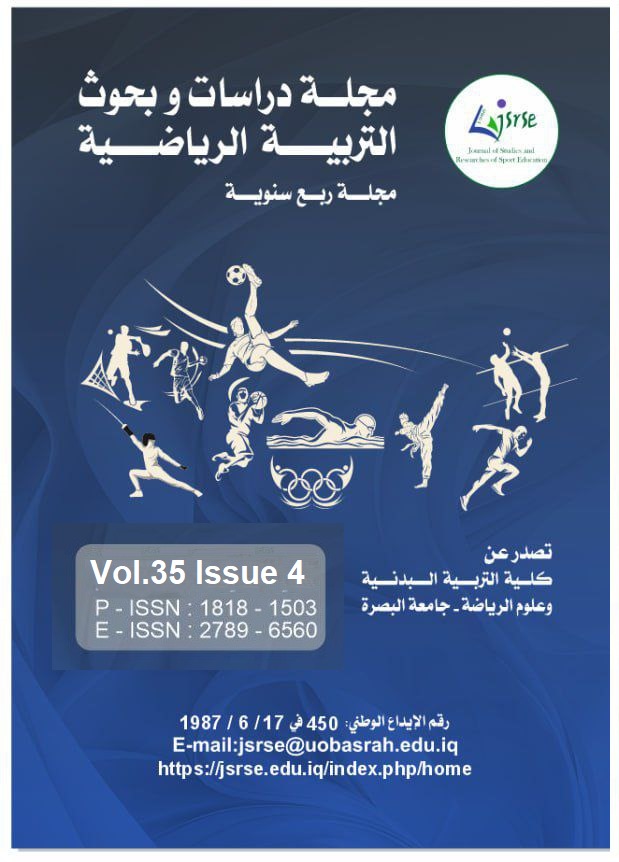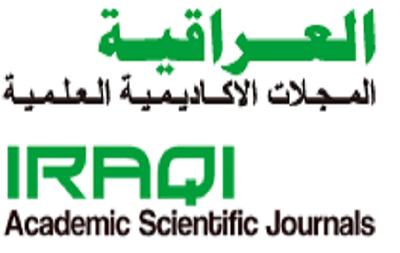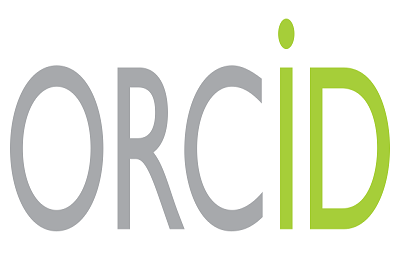Communication Skills and Their Relationship to Self-Confidence Among Iraqi University Futsal National Team Players
Main Article Content
Abstract
Abstract:
The aim of this study is to identify the level of communication skills and self-confidence among players of the Iraqi university futsal national teams for the academic year 2024–2025, as well as to examine the relationship between communication skills and self-confidence among the research sample. The researcher adopted the descriptive approach using both survey and correlational methods. The research population consisted of players from Iraqi university teams for the 2024–2025 sports season, totaling 190 players. The research sample included 160 players who were selected randomly, representing 84.21% of the total population—a percentage considered appropriate for a reliable and accurate representation of the target group.
The researcher concluded that there is a statistically significant correlation between the effectiveness of coaches' communication and the level of self-confidence among players. This highlights the importance of communication as a psychological and social tool that significantly influences athletic performance. The use of clear, precise, and timely communication strategies by coaches contributes to enhancing players’ understanding and positive interaction, which in turn reflects on their psychological stability and reduces stress during defensive play. Continuous feedback is also a critical component in completing the communication process between coach and player, as it enables immediate correction of mistakes and helps foster mutual trust.
Based on the findings of the current study, the researcher recommends that coaches of the Iraqi national teams utilize communication skills to foster self-confidence among players. Furthermore, it is advised to involve sports psychology experts to discuss players’ psychological states and confidence levels in order to promote their development.
Article Details

This work is licensed under a Creative Commons Attribution-NonCommercial 4.0 International License.
References
Abdel Amir, H. A. (2024). Academic adjustment and its relationship to psychological stress among students of the Department of Physical Education and Sports Sciences. Journal of Studies and Researches of Sport Education, 34(3), 456–467. https://doi.org/10.55998/jsrse.v34i3.719
Habib, B. (2022). Emotional Intelligence and Its Relationship with the Cognitive Psychological Outcome for Physical Education Teachers at Al-muthana Education Directorate. Journal of Studies and Researches of Sport Education, 32(2), 253–269. https://doi.org/10.55998/jsrse.v32i2.360
Hussain, K. ali, & Chasib, A. S. (2024). Psychological stress and its relationship to the accuracy of shooting in the three-pointer skill of basketball players. Journal of Studies and Researches of Sport Education, 34(4), 619–638. https://doi.org/10.55998/jsrse.v34i4.817
Khazal, H. J., Kadhum, W. H., Hussein, R. A., & Mohammed, F. H. (2025). Psychological and social pressures on people with various disabilities from the perspective of their teachers in Iraq. Journal of Studies and Researches of Sport Education, 35(3), 48–60. https://doi.org/10.55998/jsrse.v35i3.1078
Mohammed, T., & Mahmood, T. (2022). A Study of the Relationship Between the Emotional Suppression of Coaches and the Psychological Resilience of Players from the Point of View of the Players of the Northern Region Football Clubs in Iraq: Journal of Studies and Researches of Sport Education, 32(2), 67–82. https://doi.org/10.55998/jsrse.v32i2.324
Owaid, F. H. (2025). Psychological Resilience and Its Relationship with Social Skills Among Some Students of Salahaddin University. Journal of Studies and Researches of Sport Education, 35(1), 684–695. https://doi.org/10.55998/jsrse.v35i1.877
Abd, A. L. M. R. A., & Farhan, S. S. A. R. (2024). Administrative leadership methods for coaches of Diyala Governorate football clubs. Sciences Journal Of Physical Education, 17(3).
Ahmed Amin & Tarek Mohamed. (2001). The psychology of the sports team (1st ed.). Cairo: Dar Al-Fikr Al-Arabi.
Al-Shammari, M. A. (2024). Scientific research methods in physical education and sports sciences: Foundations and applications. Baghdad: Dar Al-Kutub Al-Ilmiyya.
Botterill, C., & Brown, M. (2002). Emotion and perspective in sport. International Journal of Sport Psychology, 33,Pp 38 60.
Carter, M., Reynolds, P., & Lee, T. (2022). Feedback mechanisms and performance enhancement in athletic coaching. International Review of Sport and Exercise Psychology, 15(3), 278–294.
Mahmoud Abdel Fattah Ghassan. (1995). The psychology of physical education and sports: Theory, application, and experimentation (1st ed.). Egypt: Dar Al-Fikr Al-Arabi.
Mohammed Hassan Alawi. (2002). Sports training psychology and competition (p. 221). Cairo: Dar Al-Fikr Al-Arabi.
Smith, L., & Jones, A. (2022). Effective communication strategies in team sports: Building cohesion and confidence. Journal of Sports Psychology, 45(2), 134–150.
Offy, A. (2019). The digital Indicators determination for the period of cardiac Rest ST and its response with its extreme performance intensity and its relationship with the percentage of. International Journal of Psychosocial Rehabilitation, 11(5). https://scholar.google.com/citations?view_op=view_citation&hl=en&user=qzOAEYAAAAAJ&citation_for_view=qzOAEYAAAAAJ:hqOjcs7Dif8C
Offy, A. (2019). Analysis of the social motives behind the phenomenon of women cheering in Iraqi stadiums. The Seventh International Scientific Conference, 12(4). https://scholar.google.com/citations?view_op=view_citation&hl=en&user=qzOAEYAAAAAJ&citation_for_view=qzOAEYAAAAAJ:ufrVoPGSRksC





 IASJ
IASJ CC-BY-4.0
CC-BY-4.0 turnitin
turnitin ISSN
ISSN DOAJ
DOAJ Crossref
Crossref GoogleScholar
GoogleScholar Orcid
Orcid